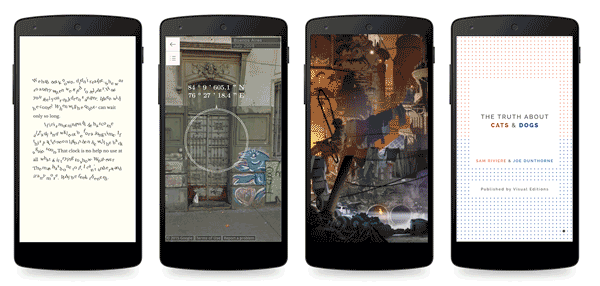Editions At Play. Why?

In 2015 we* began a project to ask and answer a lot of questions that seem to be becoming popular in late 2016. Which is the way we like it. The questions are about the nature of books, and what writers (and readers!) of literary fiction should expect from the physical liberation and narrative dynamism of a mobile-led book. Not an e-book. But a book written for the web. We called them Editions At Play.
* ‘we’ — Visual Editions in London, and Google’s Creative Lab Sydney.
[nb. this post is from Jan 2016. It got forgotten (!)]
I recently packed and unpacked my library. It is a few hundred books. Say 20 boxes. I put every book in, and took each one out. It was lovely. (Books should be held, no?) The physical book form is one of those things that we just ‘know’ — printed pages, bound together, glued to a spine — it has a beauty unto itself. And there have been a few commentaries recently on how important that form is. I have little doubt that the reverent and almost sacred feeling of boxing and unboxing my collection came from the physical quality of these treasured artefacts.
We may love the ways books feel, yet it is the meanings and the memories conjured by the words that has always been so intoxicating, and, much like the computer and the mobile phone that have come afterwards, the book’s form is just a technological conduit to information that we — humanity — create.
What is more, the way we access information has changed: we’ve moved from a time of static information, held in books and libraries, to a period of digital information, held in digital folders and on sites and servers; and we’re now moving into a period of fluid information where our children will expect to be able to access any information, anywhere, at any time — much like switching on a light.
The era of fluid information comes naturally for a species that has always placed great value on fleeting experiences: we seek out and relish fine food, drama, travel, love, and beauty in a cycle of momentary consumptions. And as we become familiar with new forms of information that are similarly transitory — digital photos, status updates, messages, and other ephemera — books’ stability and permanence may seem an anachronism.
Yet literature can be dynamic. When you re-read a book, you are not the same person that read it the first time. The greatest literature can survive multiple re-readings, each unveiling new truths — making the book ‘object’ more of a momento mori, a souvenir from the more magical, momentary ‘experience’ of reading.
Equally as the digital era propels us from static forms which ‘last’ towards dynamic forms which cannot be preserved — the web with its unprintable, unsustainable, un-saveable pages, for instance — it may be that there’s an opportunity for the book to become more like a performance: something to be found and savoured, something that does not gather dust on a shelf, something that — contrary to the books before it — is ‘unprintable’.
Two years ago we — Google’s Creative Lab and London-based publishers Visual Editions — began an experiment to explore the world of digital books, and to think about what would happen if we tapped into some of the magical, dynamic qualities of the internet and use them to make a different kind of digital literary experience.
Two years later we have something we call Editions At Play.

What kind of experience, you ask? A book that follows you around the web using a cookie, for instance; one that changes based on where you are, or the time of day; one that uses trends, or the weather, or other real-time data; one that incorporates artificial intelligence; one that shrinks or grows, or merges with other stories; one that is generative; one that fades or disappears completely, one that — much as the ancient storyteller adapted his story based on the audience sat in front of him — is shaped around a reader.
We wanted to see if we could keep the integrity of reading while we play with the book’s form.
And, importantly, we wanted to find a way to commission and champion this new kind of book — to have well-known authors work with developers and designers to create immersive digital reading experiences.
Starting this month, Editions At Play will publish new works by Reif Larsen, Joe Dunthorne, Sam Riviere, Alan Trotter via Visual Editions; and a new sci-fi anthology by Tommy Lee Edwards via Penguin Random House UK and Lex Records. Each title will be available to preview and buy through Google Play, with the ambition for Editions At Play to continue to publish 3–4 titles per year and work with publishing partners on commissioning new digital books.
What are these unprintable books like? Are they just web pages? We asked ourselves again and again what makes a book and book, what makes a book feel familiar? And the best answer we could come up with was that it must have ‘pages’.
A book is a set of pages as much as a play is a set of lines, or a dance is a series of moves. But just as turning the first page of a book sets the stage for the reader to keep turning, we wanted to find a way of setting the stage and putting in peoples’ minds a ‘reading a book’ not state, not a flicking, or swiping a social feed, or hunting for a funny picture to share state. There are other, functional reasons for pages: they are a delineator of sections of text, like chapters. And they create the opportunity for interactions. So these books will have ‘pages’, of a kind.
So alongside having pages, the other parameter we set for ourselves is that our books had to be made for reading on mobile, because right now that’s where everyone is reading, and we would like to put the delights of long-form reading where most of us spend most of our time. We don’t believe that we can wait and see, we need to play about and experiment. The phone also makes for an intimate reading experience — after all, who would read a novel on their desktop — and makes us think of tucking a paperback in your back pocket.
It is an exciting time for writers, as well as for readers. Every other form of media is borrowing and experimenting with aspects of art, culture and technology previously unavailable to them. Nostalgia is rubbing shoulders with innovation on every size of screen. We want books that act as powerfully on the imagination as any Penguin classic, but have the potential to generate the awe and magic of your favourite app. It comes as no huge surprise that our new digital books have drawn upon quite a few familiar forms: we have commissioned well known literary writers, we have stuck to our belief that the reading experience relies heavily on text and words on pages. These parameters might feel traditional, or familiar, but they are also packed with opportunity as we shift from text in ink on paper to dynamic, digital information adapting to fit our need as a reader. It is possible for us to draw on those utilitarian technical possibilities and give them to authors and writers in a way that allows them to dream beyond the binding of the book. We hope that Editions At Play is serendipitously timed to meet the needs of that new kind of writer and reader at the start of a new age of reading.
